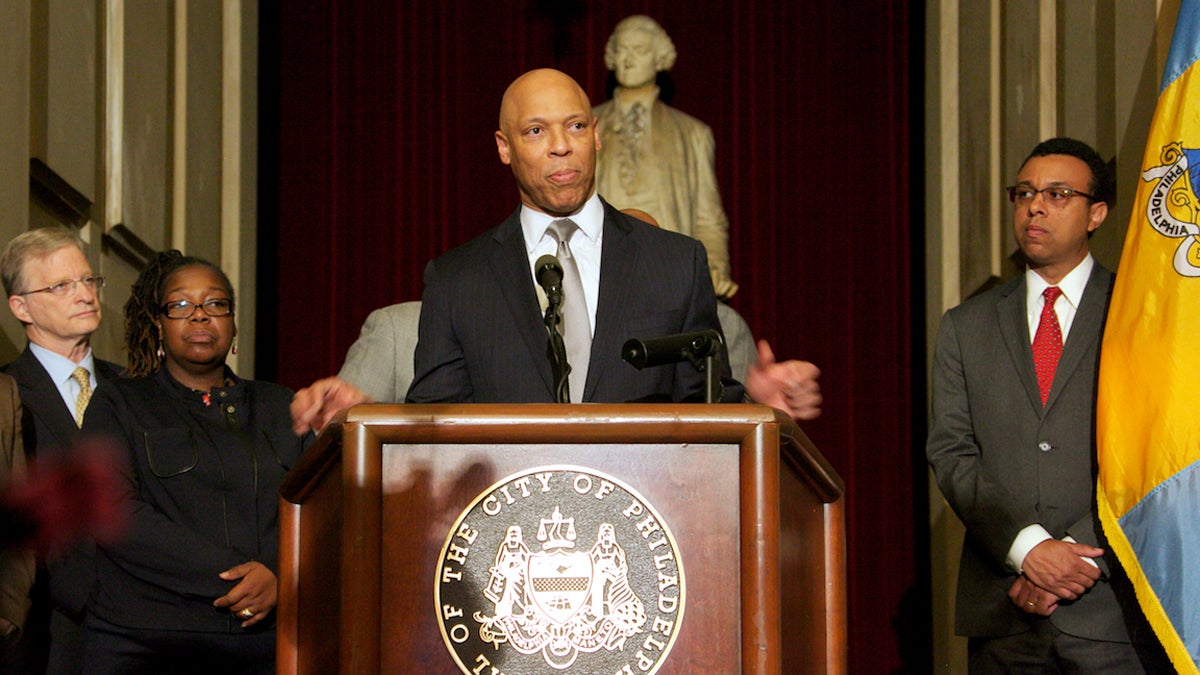Philly schools chief again appeals to teachers for salary, benefits concessions

Dr. William Hite, Philadelphia school superintendent, says additional school funds need to some from teachers union concessions. (NewsWorks file photo)
Staff shortages. Classrooms packed to the brink. Scarce money for basic school supplies.
This is the current reality for the Philadelphia School District.
As of Tuesday, district officials said they can count on only $83 million of the $304 million they said they needed in the spring:
$16 million from district savings
$15 million from improved local tax collections
$2 million from the state increasing its basic education funding
$50 million from the city — but the exact source of that money is still a point of disagreement between the mayor and city council.
So what resources does this $83 million bring back to a district that laid off 3,859 employees in June?
“The bare minimum,” said William Hite, Philadelphia school superintendent.
By that he means a bare-bones staffing and services scenario where:
student-to-teacher ratios in classrooms districtwide will be at the 33-to-1 maximum allowed in grades four through 12 by the contract with the Philadelphia Federation of Teachers;
only select schools will have guidance counselors and assistant principals;
money for building and instructional supplies will be at a premium;
outside of fall sports, no funding is allotted for district extracurriculars; and there is no funding for spring sports and music teachers beyond January.
Hite says that, at this point, additional funding for schools must come primarily from concessions from the teachers union.
In addition to changing work-rule provisions — some that would weaken seniority — the district wants teachers to take pay cuts ranging from 5 to 13 percent (employees making more, would contribute more) and begin paying into basic health-care coverage. Those concessions would add up to $103 million.
“If [district teachers] were using this profession to get rich, then this is not the place, and teachers will tell you that,” said Hite. “What keeps them here is the work that they do with students, the fact that they’re acknowledged and respected, and the fact that they can grow and develop professionally.”
Union members disagree with Hite’s rationale.
“I don’t think we’re being respected,” said Amy Roat, teacher and union representative at Feltonville School of Arts and Science.
“What keeps us here in the district is the kids and that this is our community and our city,” she said. “I agree that we’re not trying to get rich, but I’m also not trying to be as poor as some of my students are either.”
Jerry Jordan, president of the Philadelphia Federation of Teachers, could not be reached for comment.
The current teachers union contract runs out Saturday.
Hite says the district is “committed to reaching some sort of agreement” by then.
The district is seeking an additional $30 million in concessions from the unions representing school administrators (CASA), noontime aides (now rebranded as “school safety officers” by their union, UNITE HERE), and school police.
Act 46 in the mix
But what happens if a contract agreement can’t be reached by Saturday?
If the union leaders reach a consensus with the district, PFT members will vote to accept the agreement or send leadership back to the table.
That vote is slated for Monday evening at Temple University’s Liacouras Center.
Another thing to keep in mind: Under the same state code that set up the School Reform Commission and placed the district under state control (Act 46), if teachers strike, the Pennsylvania Secretary of Education can revoke individual teaching certificates.
In the past, the SRC has argued that it has the legal right to impose contract terms on its union employees. The PFT has long disagreed.
Asked about his interpretation in an interview Tuesday, Hite said, “I’m not even sure that’s a true statement that that power is even available.”
In 2012, SRC chairman Pedro Ramos lobbied the state to specifically delineate that power.
Appealing to Republicans in the state Legislature, Ramos said Act 46, as written, didn’t give the SRC “enough juice.”
According to the Inquirer, Ramos wanted an amendment that would specifically give the SRC the power to nullify union contracts and unilaterally dictate salary and benefits to school district employees.
When Philadelphia’s state delegation found out about Ramos’ request, the proposed amendment died without getting through committee.
Class sizes set to remain
If the district gets everything it wants from labor ($133 million), the state will likely kick in the $45 million currently sitting in wait for the district to adopt a “reform agenda.”
All told, this potentially would bring the district another $178 million, which Hite said would bring back 1,700 more staffers, as well as specialty classes such as language instruction, intervention programs and Advanced Placement courses, in addition to increased funding for building and instructional supplies.
Despite the potential gains, though, Hite said this money still wouldn’t do anything to reduce class sizes.
In the Philadelphia School District, packing classrooms to the contractual limit seems destined to be the new normal.
Holly Otterbein contributed reporting to this story.
WHYY is your source for fact-based, in-depth journalism and information. As a nonprofit organization, we rely on financial support from readers like you. Please give today.

